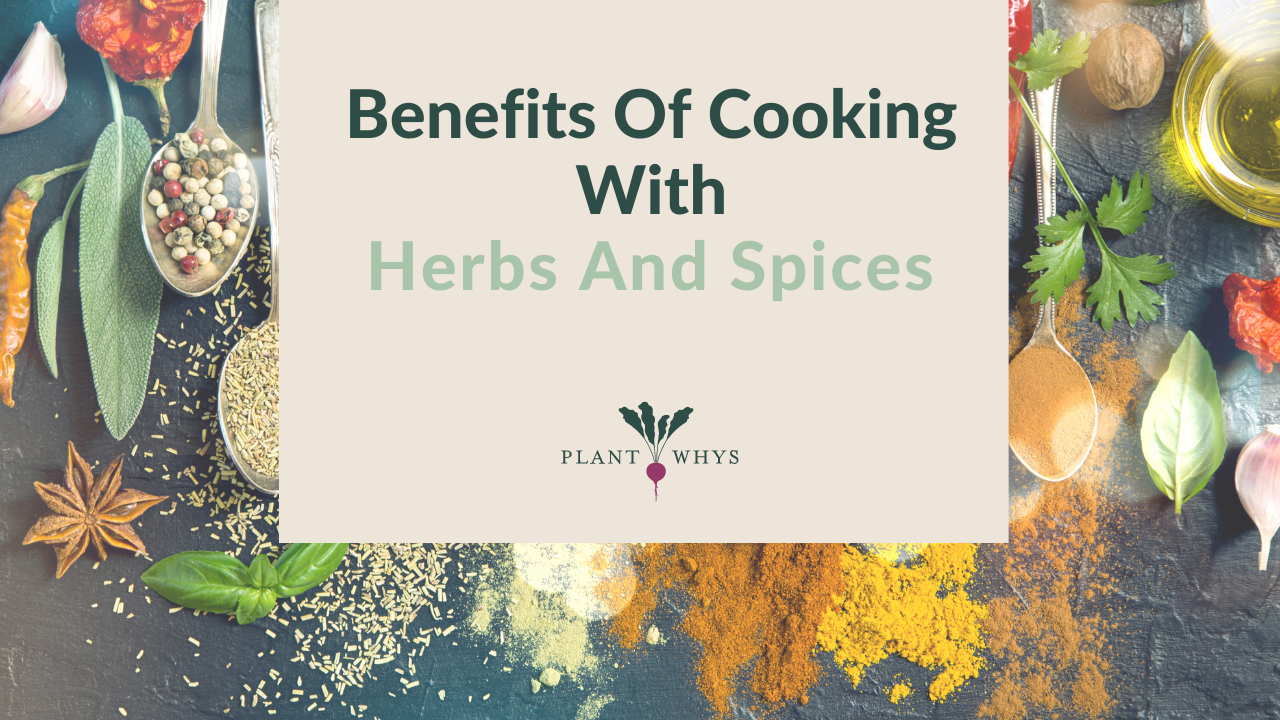What Are The Benefits Of Cooking With Herbs And Spices?
Jul 17, 2022
Herbs And Spices Make Our Gut Super Happy
Herbs And Spices Can Mitigate Harmful Compounds In Certain Foods
Tips For Using Herbs And Spices When Cooking
Cinnamon
Cumin
Nutmeg
Cloves
Turmeric
Thyme
Rosemary
Peppermint
Spices Are A Daily Essential Food
Jiang T. A. (2019). Health Benefits of Culinary Herbs and Spices. Journal of AOAC International, 102(2), 395–411. https://doi.org/10.5740/jaoacint.18-0418
Tapsell, L. C., Hemphill, I., Cobiac, L., Patch, C. S., Sullivan, D. R., Fenech, M., Roodenrys, S., Keogh, J. B., Clifton, P. M., Williams, P. G., Fazio, V. A., & Inge, K. E. (2006). Health benefits of herbs and spices: the past, the present, the future. The Medical journal of Australia, 185(S4), S1–S24. https://doi.org/10.5694/j.1326-5377.2006.tb00548.x
Jaksevicius, A., Carew, M., Mistry, C., Modjtahedi, H., & Opara, E. I. (2017). Inhibitory Effects of Culinary Herbs and Spices on the Growth of HCA-7 Colorectal Cancer Cells and Their COX-2 Expression. Nutrients, 9(10), 1051. https://doi.org/10.3390/nu9101051
Verdin, S. & Hachmeister, Kathy & Smith, J.. (2003). Inhibition of heterocyclic amine formation in beef patties with added spices and ingredients. Kansas Agricultural Experiment Station Research Reports. 10.4148/2378-5977.1647.
Vangnai, Kanithaporn & Jirapakkul, Wannee & Smith, J. (2011). Inhibitory Activity of Asian Spices on Heterocyclic Amines Formation in Cooked Beef Patties. Journal of food science. 76. T174-80. 10.1111/j.1750-3841.2011.02338.x.
Kasprzak-Drozd, K., Oniszczuk, T., Stasiak, M., & Oniszczuk, A. (2021). Beneficial Effects of Phenolic Compounds on Gut Microbiota and Metabolic Syndrome. International journal of molecular sciences, 22(7), 3715. https://doi.org/10.3390/ijms22073715
Jaksevicius, A., Carew, M., Mistry, C., Modjtahedi, H., & Opara, E. I. (2017). Inhibitory Effects of Culinary Herbs and Spices on the Growth of HCA-7 Colorectal Cancer Cells and Their COX-2 Expression. Nutrients, 9(10), 1051. https://doi.org/10.3390/nu9101051
Khader, M., & Eckl, P. M. (2014). Thymoquinone: an emerging natural drug with a wide range of medical applications. Iranian journal of basic medical sciences, 17(12), 950–957.
Embuscado, M. E. (2019). Bioactives from culinary spices and herbs: a review. Journal of Food Bioactives, 6. https://doi.org/10.31665/JFB.2019.6186
Lewin, Joe. (2021). Top 5 Health Benefits of Cinnamon. BBC Good Food. Accessed: July 8, 2022. https://www.bbcgoodfood.com/howto/guide/health-benefits-cinnamon
Kubala, Jillian. (2019). 8 Science Backed Benefits of Nutmeg. Accessed: July 9, 2022. https://www.healthline.com/nutrition/nutmeg-benefits
Brennan, Dan. (2020). Cloves: Health Benefits of Cloves. Accessed: July 8, 2022. https://www.webmd.com/diet/health-benefits-cloves
Richter, Amy. (2021). 12 Benefits of Thyme. Accessed: July 8, 2022. https://www.healthline.com/health/health-benefits-of-thyme#Thyme-to-boost-your-mood
Brennan, Dan. (2020). Health Benefits of Rosemary. Accesed: July 8, 2022. https://www.webmd.com/diet/health-benefits-rosemary
Groves, Melissa. (2018). 12 Science Backed Benefits of Peppermint Tea and Extracts. https://www.healthline.com/nutrition/peppermint-tea#TOC_TITLE_HDR_12
Nielsen, Desiree. (2022). Good For Your Gut: A plant based digestive health guide and nourishing recipes for living well.
Click here to learn more about our plant-based membership called, The Collective
Stay connected with news and updates!
Join our mailing list to receive the latest plant-based tips, tricks, and recipes.
Don't worry, your information will not be shared.
We hate SPAM. We will never sell your information, for any reason.

